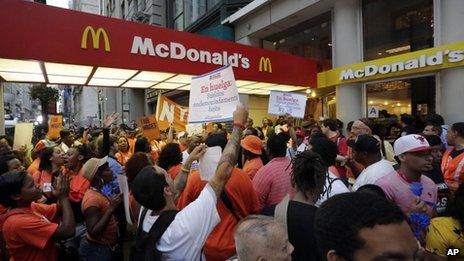US fast-food workers on strike over pay
- Published
Samira Hussain met a low paid worker in New York
Fast-food workers in dozens of US cities are on strike, union leaders say, in what could be one of the industry's biggest walkouts.
Workers want to be paid $15 (£10) an hour, double the rate for many employees at fast-food chains.
In New York City, about 300 protesters flooded into a McDonald's near the Empire State Building.
The strike comes amid calls by President Barack Obama and some lawmakers to raise the US minimum wage.
Those members of Congress suggest bringing the current rate up to $9 an hour from $7.25, previously set in 2009.
Labour Secretary Thomas Perez, who is taking a lead role in the Obama administration's minimum wage push, said: "For all too many people working minimum wage jobs, the rungs on the ladder of opportunity are feeling further and further apart."
In addition to a walkout at fast-food chains in 60 cities, including New York, Chicago and Detroit, employees at retail firms in some cities were expected to join, say union leaders.
Other cities included Boston, Atlanta, Hartford, Los Angeles, Milwaukee and St Louis.
But turnout varied significantly across the nation, with some targeted restaurants appearing to operate normally while others were unable to do business.
'Below poverty line'
At a Wendy's in New York City, about 150 workers and supporters stood outside chanting: "We can't survive on $7.25".
Many workers say they cannot live on the minimum wage, which would net $15,000 a year for full-time work.
But many note they are rarely scheduled for full working weeks.
In Raleigh, North Carolina, about 30 fast-food workers picketed outside a Little Caesars pizza restaurant.
Julio Wilson said he earns $9 an hour and had worked there for about six months. He said that pay was insufficient to support himself and his five-year-old daughter.
"I know I'm risking my job, but it's my right to fight for what I deserve," Mr Wilson said.
In addition to advocating for $15 an hour, workers are calling for the right to unionise without interference from employers.

Fast-food workers protest outside a McDonald's in downtown New York City on Thursday
In statements, McDonald's and Burger King Worldwide said they did not make pay decisions at the majority of US restaurants that operate as independent franchises.
The firms have argued that raising entry-level wages would lead to higher overall costs and higher prices.
A spokesman for the National Restaurant Association, a restaurant lobbying group, told the Associated Press news agency that low wages reflect the fact that most fast-food workers tend to be younger and have little work experience.
But Mary Kay Henry, of Service Employees International Union (SEIU), a labour group supporting the strike, says many fast-food workers are no longer only teenagers.
"The median wage [for service workers] of $9.08 an hour still falls far below the federal poverty line for a worker lucky enough to get 40 hours a week and never have to take a sick day," she said.
The US fast-food industry has come under increasing scrutiny because part-time jobs, including retail and food positions, have made up most of the job growth since the recession.
Earlier this summer there was a one-day walkout by about 2,200 fast-food workers.
- Published29 August 2013